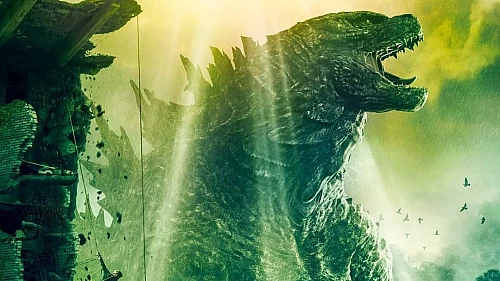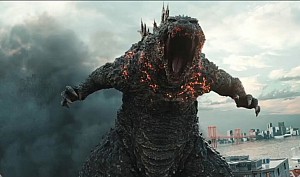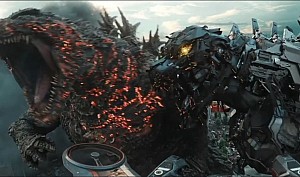Godzilla Video Essay
Godzilla Fan Works Forum Topic
bpick993
MemberMothra LarvaeFebruary 26, 20152124 Views6 RepliesHi Everyone,
As part of my Masters degree I have been taked to do a 10 minute video essay on whatever I want, so naturally I choose Godzilla. I want to analyse how his meaning has been influenced and changed as he has become a transnational icon. I would love to hear your opinions, and any links you have to interesting critical material on Godzilla. Thanks for taking the time to read this, and I hope you can help me make a great video essay.
Other discussions started by bpick993
Replies to Godzilla Video Essay

Without out a doubt, this is the best possible source I could give you. More more myself later.

That sound's like a great subject to do an essay on. You can go past the usual Cheesy side of Godzilla that the media thinks is him when its really not.
I don't have a lot of video's i can give you, but when writing the essay write it in a way that it feel's like you are convincing the reader. Professor's love that, and also may change the opinion on Godzilla if they think its cheesy.
Good grief.

Try destroying some Godzilla stereotypes?
“Banana oil.”- George Takei, Gigantis: The Fire Monster

Guys he said he's writing about how Godzilla's meaning has been influenced and changed over the years as he's become an icon. Not to directly attack misconceptions. The only way to make people consider there's more to Godzilla than misconcieved notions of low budgets, cheese, bad effects and acting is to treat it and study it seriously with some real names, history and reasons behind it. Not to point out how viewpoints are off base
BPick993,
What makes Godzilla eclectic is largely dependant on the political and social climate of what's happening at the time. It's even dependant on the state of Japanese cinema as it grows.
In the 1950s Godzilla was of course the well known model for radioactive paranoia. Although today many fans like to compare him to the atom bomb and talk him up as some sort of physical manifestation of its destructive properties, Godzilla's relation to it is actually the more poignant variable of the film.
The original film shows that wherever Godzilla steps leaves radioactivity and this is extremely concerning for Dr. Yamane. When the public are told that a monster was unleashed due to atomic tests their lingering fear of radioactivity comes in-- Extras mention a real-life incident with radioactive tuna on the market. They concern themselves with bombshelters, many of which are still around despite Nagasaki and Hiroshima happening 9 years prior.
Godzilla was a stronger manifestation of radioactive paranoia and, at the end of the day, "atomic therapy". (Which is a term coined by J. Hoberman in his essay on the original film.) The characters beat Godzilla at the end of the film using another controversial weapon which represents a sort of revisionist history of the atom bomb's genesis. (Covering up its secrets, rather than exposing it to the world.) So at the end of the day the Japanese defeat their radioactive paranoia by both killing Godzilla and putting the ultimate lock and key on another weapon of mass destruction. It was a country's ultimate fantasy. One of relief.
Similar images and ideas were present in Godzilla Raids Again, Rodan and Varan.
In the 1960s Godzilla was still a walking villain, but not the same sort of terror he was in the original. There were other concepts to be tackled. One of my favorites is director Ishiro Honda's sense of rising feminism. Women were taking a more important role in Japanese culture during the post-war. Junko Nakanishi, in Mothra vs. Godzilla, is a photographer constantly under her boss's thumb. She's not particularly well treated, but she's good at what she does. In the end it's her plea to the natives of Infant Island and the Shobijin that convince Mothra to battle Godzilla.
Ghidorah: The Three Headed Monster includes a woman, Princess Salno, who is given a power above all men to see the future. She warns everyone Godzilla, Rodan and King Ghidorah will rise and she is, of course, correct.
Then there's Ms. Namikawa from Monster Zero-- An oppressed alien female who defies her planet's laws and gives Glenn the information he needs to defeat the Xillians. She's a pulpy, comicbook-esque character, but that's why she works in that context.
Godzilla's slow transformation from radioactive reminder, to movie villain, to anti-hero and, finally, hero is something based on both the culture and changing cinema. Toho had uncovered a new successful genre in the original Godzilla, dubbed by fans as tokusatsu. It could stand toe-to-toe against Hollywood's special effects giants, but only because it wasn't trying to compete with Hollywood. Toku was its own style that played its own game. It wasn't about realism or naturalism, it was about style and mood. It was about the Japanese making something out of what little they had and they were successful with it. So it had to be opened for a larger audience. Because of that Godzilla slowly transformed into a hero and became more accessable to children.
Along the way the nuclear theme and concerns were still brought up. What if terrorist organizations tried to create nuclear weapons on their own? Such a relevant issue is used as the basis for Godzilla vs. The Sea Monster. What if radioactivity is used for experimentation outside of bombs? Son of Godzilla tackled that one.
Other relevent issues are touched on as the series got further away from the radioactive paranoia. Japan faced a massive depression in the late 60s and 70s. During this era it was also labeled one of the more polluted countries in the world. Godzilla's Revenge touches on how hard it is to grow up in depression-time Tokyo and how desperate people are through it's antagonists. Meanwhile, Godzilla vs. Hedorah and Godzilla vs. Gigan both non-too-subtlely hit on the pollution angle.
When Godzilla was rebooted in 1984 with The Return of Godzilla (americanized as Godzilla 1985) Toho naturally took a stab at the Cold War. How does a Cold War world react to a radioactive beast? Would countries cooperate? What is Japan's nuclear strike position? Does their history with the bomb and radioactivity give them a different position on the matter? All of these questions are asked and answered in some form as Godzilla becomes the observer of the Cold War world. He's not so much a metaphor as he is a journeyman testing the allegences of world powers.
Godzilla vs. Biollante became the subject of a few things. Although here Godzilla's cells is a player in the dangers of biotechnology and bio-sciences, he's also the victim of monopolization. Three different factions go into an espionage-esque war over his cells for various reasons. The most interesting of these three, to me anyway, is Bio-Major and Okochi Foundation. They want to use Godzilla's cells to create a bacteria which would render the effects of radioactivity intert. If science had really found something that could reduce the effects of the bomb of course nations/organizations would be after each other for it! So Godzilla vs. Biollante sees Godzilla as a profitable creature which can be used to create a counter weapon.
This same idea is lightly touched on in the original 1954 Godzilla. Dr. Yamane wants to study Godzilla because he survived the atom bomb and was able to safely absorb its properties. He believes the answer to countering radioactivity is somewhere in Godzilla. Godzilla vs. Biollante takes this a step further by proving his point, but realizes organizations would be at each others throats trying to monopolize G-Cells. So Godzilla is now a long desired answer to de-weaponizing radioactivity.
Unchecked capitalism is something Godzilla also represents-- At least as a series. Mothra vs. Godzilla noted the dangers of Japan's embrace of capitalism. Because Japan was still a country in transition during the early 1960s, it makes sense that there would be reservations over the newly installed capitalistic system. Godzilla vs. King Ghidorah is an example of how unchecked capitalism can lead to unchecked nationalism through the character Shindo, mirrored by Godzilla. Both Shindo and Godzilla came from a different era-- They were both smaller notes in history. One was just another soldier and the other was a survivor. An animal. 45 years later they're both juggernauts. One had embraced capitalism and grown too confident; to the point he even harbored nuclear weapons in secret, despite his nation's anti-nuclear weapon stance. The other was also changed. He had been used and transformed into something horrible.
Later in the Millennium series Godzilla would represent the "Spirits of War Dead" in Godzilla, Mothra, King Ghidorah: Giant Monsters All-Out Attack. Being the most poignant interpretation in years and years, this Godzilla was bringing to mind the idea of lost or revisionist history. It's something Miyazaki has done less successfully in recent years. Director Shusuke Kaneko used Godzilla not as a metaphor for nuclear paranoia or an observer of present times, but as a reminder with punch.
Modern Japan seems to gloss over the events of WWII and play the victim card when it skips ahead to the bombings. Depicting the country's people as lost in touch with previous generations and history, Godzilla's mission was to literally pummel the reminder out of them. He felt the rage of Americans, Chinese and Japanese that the country refused to acknowledge and as such was the physical manifestation of the past come to teach a hard history lesson. The movie became the subject of discussion amongst some Japanese historical scholars and school professors.
For my views on the latest 2014 film, I recommend reading my article here.
I know it's fairly long, but it's a pretty broad topic you've asked to pull opinions from-- Even what I wrote is an abbreviation of everything I could dive into. I hope it helps. Do share your video essay when you're done.

^That's pretty much the best advice for this.
“Banana oil.”- George Takei, Gigantis: The Fire Monster

I think it's unfortunate more people aren't helping this guy out. It's a great opportunity to discuss something very relevent.
(Which... lets be honest, doesn't happen a lot around here...)




